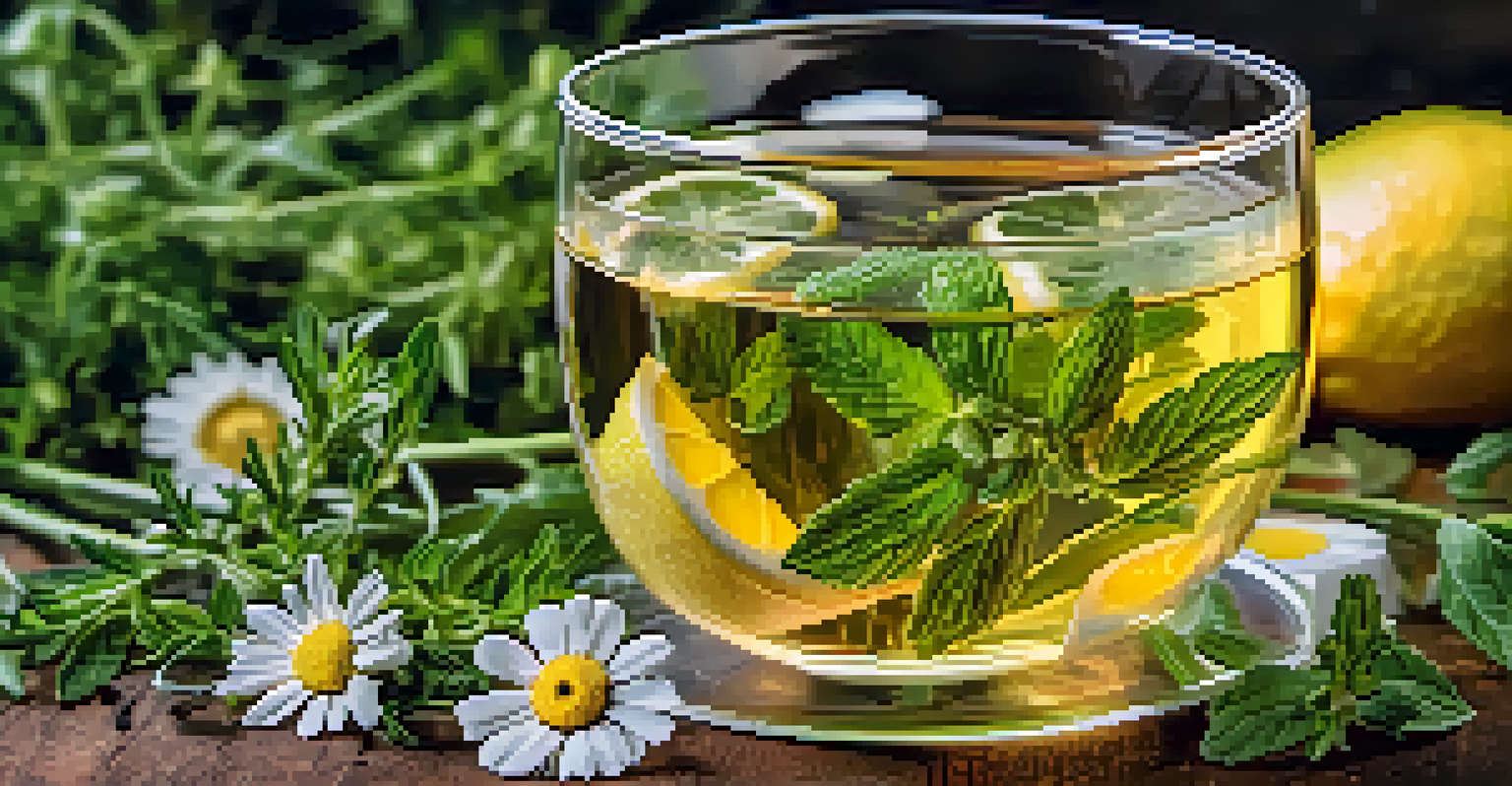The Importance of Hydration in Naturopathy for Aging Well

Understanding Hydration and Its Role in Naturopathy
Hydration is more than just drinking water; it's a crucial element in naturopathy that supports overall health. As we age, our bodies become less efficient at retaining water, leading to dehydration, which can affect everything from skin elasticity to cognitive function. Naturopathy emphasizes natural remedies and lifestyle changes, making hydration a foundational principle in its approach to wellness.
Water is the source of life, and without it, there is no vitality.
In naturopathy, hydration is linked to the body's ability to detoxify and maintain homeostasis. Water aids in flushing out toxins and delivering essential nutrients to cells, which is vital for the aging process. A well-hydrated body can better manage stress, inflammation, and overall vitality, demonstrating the interconnectedness of hydration and health.
Moreover, understanding the body's unique needs is essential, particularly in older adults who may have different hydration requirements. Engaging with a naturopath can help tailor hydration strategies that consider individual health concerns and lifestyle, ensuring optimal benefits for aging well.
Signs of Dehydration in Older Adults
Dehydration can sneak up on anyone, but older adults are particularly vulnerable. Signs of dehydration may include dry skin, fatigue, dizziness, and confusion—symptoms that can easily be mistaken for the natural aging process. Recognizing these signs is crucial for timely intervention and maintaining health.

Another common indicator is a decrease in urine output or darker urine, which can signal that the body is not receiving enough fluids. As we age, our thirst sensation diminishes, making it vital to cultivate habits that ensure adequate fluid intake. This is where mindfulness about hydration becomes a proactive strategy.
Hydration Supports Overall Health
Maintaining proper hydration is crucial for detoxification, cognitive function, and skin health, especially as we age.
Additionally, factors such as medications and chronic health conditions can exacerbate dehydration risks. Being aware of these factors allows older adults and caregivers to take preventive measures, like setting reminders to drink water or incorporating hydrating foods into their diets.
The Connection Between Hydration and Skin Health
Hydration is a key player in maintaining youthful, healthy skin, especially as we age. Water helps keep skin supple and elastic, reducing the appearance of fine lines and wrinkles. In naturopathy, the focus on hydration extends beyond just drinking water to include nourishing the skin from the inside out.
Hydration is key to unlocking the body's potential for healing and wellness.
When the body is adequately hydrated, it can effectively eliminate toxins that may contribute to skin issues such as dryness and irritation. This internal cleansing supports the skin's natural glow and resilience, making hydration a critical component of any anti-aging skincare routine.
Moreover, incorporating hydrating foods like cucumbers, tomatoes, and berries into your diet not only boosts hydration levels but also provides essential vitamins and antioxidants. This holistic approach aligns perfectly with naturopathic principles, promoting beauty through wellness.
Hydration's Role in Cognitive Function
Staying hydrated is essential for maintaining cognitive function as we age. The brain is about 75% water, and even mild dehydration can lead to difficulties in concentration, memory, and mood. This highlights the importance of hydration in supporting mental clarity and emotional well-being.
Naturopathy recognizes the brain-body connection, emphasizing that proper hydration can influence everything from energy levels to stress management. By drinking enough water, older adults can help mitigate cognitive decline and promote a sharper mind as they age.
Recognizing Dehydration Signs
Older adults may experience dehydration symptoms like dry skin and confusion, making it vital to stay aware and proactive.
Incorporating hydration into daily routines, such as drinking water before meals or keeping a water bottle handy, can make a significant difference. These simple habits can help create a sustainable approach to maintaining cognitive health over time.
Hydration and Digestive Health
Digestive health is another critical area where hydration plays a vital role, especially for older adults. Adequate fluid intake helps maintain the mucosal lining of the intestines, facilitating smooth digestion and nutrient absorption. In naturopathy, a well-functioning digestive system is key to overall health.
Dehydration can lead to constipation and other digestive issues, which are often more common in aging populations. Drinking sufficient water and consuming high-fiber foods can work together to promote regular bowel movements and a healthy gut.
Furthermore, herbal teas and broths are excellent hydrating options that can enhance digestive health while providing additional nutrients. This holistic approach reflects the naturopathic philosophy of treating the body as a whole.
Creating a Hydration Plan for Aging Well
Developing a personalized hydration plan can significantly benefit aging individuals. This plan should consider daily water intake goals, preferred sources of hydration, and any specific health conditions that may affect fluid needs. Consulting with a naturopath can provide tailored guidance to create an effective strategy.
Incorporating a variety of hydrating beverages, like herbal teas, infused waters, and soups, can make hydration enjoyable and diverse. Additionally, setting reminders or using hydration apps can help establish consistent drinking habits throughout the day.
Herbal Teas Enhance Hydration
Incorporating herbal teas into hydration routines not only provides fluids but also offers additional health benefits.
Lastly, it’s essential to listen to your body and adjust the plan as needed. Factors such as physical activity, climate, and overall health should be considered to ensure that hydration remains a priority in the journey toward aging well.
The Benefits of Herbal Hydration
Herbal teas and infusions provide not just hydration but also various health benefits, making them an excellent addition to a hydration strategy. Ingredients like chamomile and peppermint can soothe digestion, while hibiscus may help regulate blood pressure. This aligns with the holistic view of naturopathy, where every sip contributes positively to health.
Incorporating herbs into your hydration routine can be an enjoyable way to enhance flavor without added sugars or calories. Experimenting with different herbal blends can also keep hydration exciting, encouraging consistent intake.

Moreover, many herbal teas are rich in antioxidants, which protect cells from damage and support overall well-being. This multifaceted approach to hydration through herbal options showcases the beauty of combining nature's offerings with the principles of naturopathy.